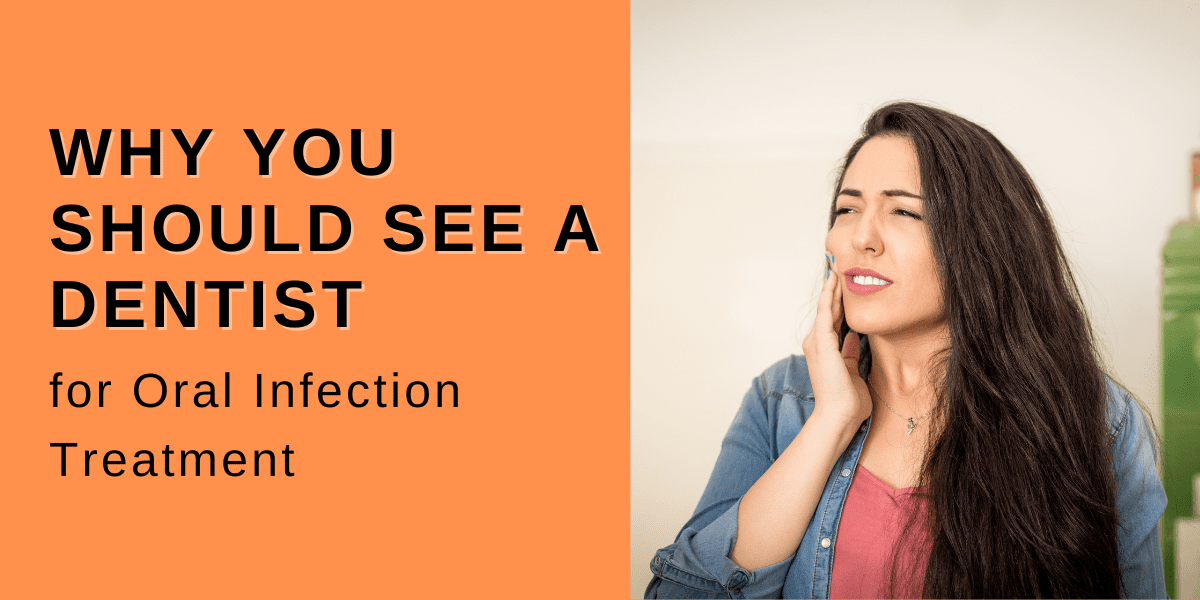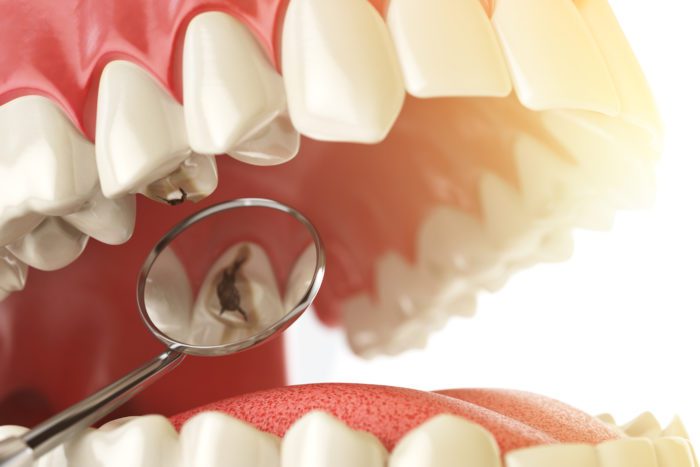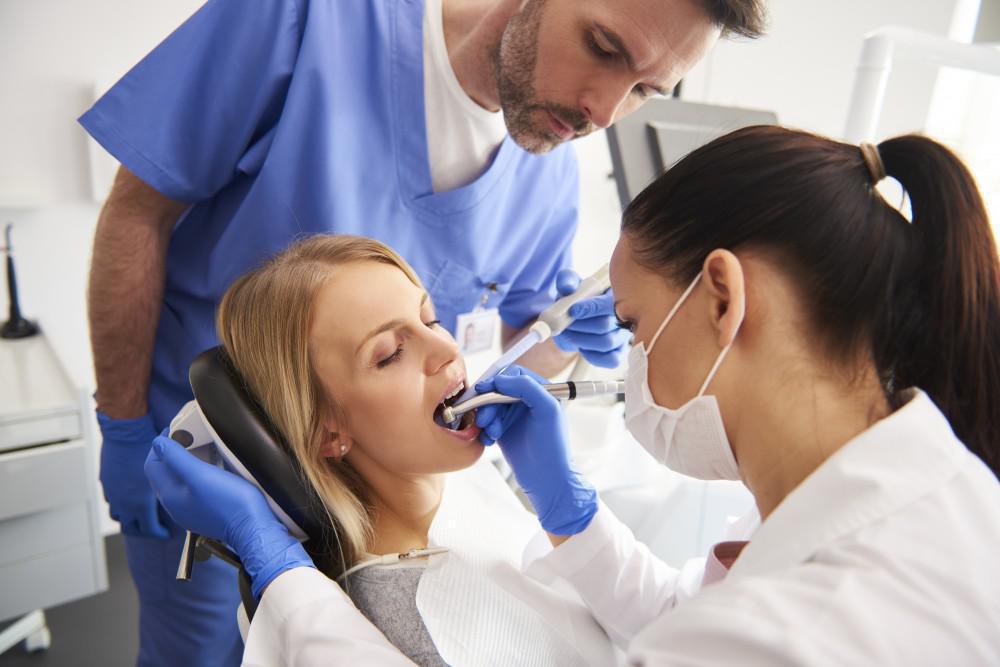
Many people don’t realize that oral health can greatly impact their overall health. That’s why seeing a dentist regularly for cleanings and checkups is important. And if you think you might have an infection, it’s even more important to get treatment right away. Here’s why you should see a dentist for oral infection treatment.
Signs of Oral Infection
There are a few different signs that you might have an oral infection. First, you may notice that your gums are red, swollen, and tender. You may also have bleeding gums, bad breath, or pus coming from your gums. If you have any of these symptoms, it’s important to see a dentist immediately so the infection can be treated.

Treatment Options
Your dentist will be able to determine whether or not you have an infection and, if so, what the best course of treatment is. In some cases, antibiotics may be necessary to clear the infection. In other cases, a deep cleaning may be all that’s needed. It’s important to follow your dentist’s instructions so that the infection can be treated appropriately and doesn’t come back.
The Importance of Treatment
Getting treatment for oral infection is essential because it can lead to more serious problems if not treated correctly. For example, an infection can spread to other parts of your body and cause serious illness. Additionally, an untreated infection can damage your teeth and gums permanently. That’s why seeing a dentist at the first sign of an infection is so important.

Teeth infections treatment
A tooth infection, also called dental caries, is an infection of the tooth. It is caused by bacteria that live in the mouth and on the teeth. The bacteria make their way into the tooth through small cracks or holes in the enamel. Once inside, they begin to multiply and cause the tooth to decay.
The most common symptom of a tooth infection is pain. The pain can be dull or sharp, and it may get worse when you chew or touch the infected tooth.
Other symptoms include:
• Swollen gums
• Redness or inflammation of the gums
• Sensitivity to hot or cold temperatures
• Bad breath
• Fever
If you think you have a tooth infection, it is important to see your dentist right away so that they can prescribe antibiotics to clear the infection. If left untreated, a tooth infection can spread to other parts of your body and cause serious health problems.

At-Home Treatment for a Tooth Infection
There are several things you can do at home to ease the pain and treat the infection:
1. Rinse your mouth with warm water – This will help remove any food particles irritating your gums. It will also help to reduce swelling and inflammation.
2. Apply a cold compress – Applying a cold compress to your cheek will help to numb the pain and reduce swelling. Do not apply the compress directly to your gums, as this could aggravate them further.
3. Take over-the-counter pain medication – Ibuprofen or acetaminophen can help to relieve pain and reduce inflammation. Be sure to follow the directions on the package carefully so that you do not take more than recommended.
4. Try cloves – Cloves contain antioxidants that can help to kill bacteria and relieve pain. To use cloves, crush a few garlic cloves and mix them with water to form a paste. Apply the paste to the infected tooth and leave it for 10 minutes before rinsing your mouth with warm water. You can also try placing a whole clove directly on the affected tooth if you do not have any garlic on hand.
5. Drink lots of fluids – Drinking lots of fluids will help to keep your mouth hydrated and prevent further irritation of your gums from dryness. Water is always our first choice, but herbal tea can also help treat a tooth infection. Chamomile tea has anti-inflammatory properties that can help reduce swelling, while ginger root tea can help with nausea often associated with infections.

Antiseptic mouthwash for tooth infection
Antiseptic mouthwash is a type of mouthwash that contains chemicals that kill bacteria or other organisms. It’s different from regular mouthwashes, which just Freshen your breath. When used correctly, antiseptic mouthwashes can help reduce plaque and gingivitis. They can also help with bad breath.
How Does It Work?
Antiseptic mouthwash works by killing the bacteria that cause infections. The chemicals in the mouthwash work to break down the cell walls of the bacteria. This makes it difficult for the bacteria to reproduce, which reduces the number of harmful bacteria in your mouth.
Is It Effective?
Studies have shown that antiseptic mouthwashes are effective at reducing plaque and gingivitis. They are also effective at killing bad breath-causing bacteria. However, they are not as effective at preventing cavities as fluoride mouthwashes.
If you’re suffering from tooth pain, you may want to try using an antiseptic mouthwash. While they’re not as effective at preventing cavities as fluoride mouthwashes, they may still help reduce your tooth pain.

How much does a dentist visit cost for an oral infection treatment?
Oral infection treatments can vary in cost depending on the severity of the infection and the type of procedure required. The cost also varies depending on whether you have dental insurance. That being said, most dental insurance plans will cover at least half the cost of oral infection treatment.
If you don’t have dental insurance or your treatment isn’t covered by insurance, you can expect to pay between $75 and $200 for a simple extraction. For more complex procedures, such as a root canal, you can expect to pay between $500 and $1,500.
If you think you may have an oral infection, it’s important to see a dentist as soon as possible so they can properly diagnose and treat it.

If you’re experiencing tooth pain, it’s important to see a dentist as soon as possible. They can properly diagnose the cause of your pain and recommend the best course of treatment. In the meantime, there are some things you can do at home to help reduce your tooth pain. These include using a cold compress, taking over-the-counter pain medication, and using an antiseptic mouthwash. If you don’t have dental insurance, you can expect to pay between $75 and $200 for a simple extraction. For more complex procedures, such as a root canal, you can expect to pay between $500 and $1,500.
Frequently Asked Questions (FAQs)
Can a tooth infection heal itself?
An infection in the mouth won't go away on its own. If an infection kills the pulp inside your tooth, your pain can stop. You may not be able to feel the pain because the nerve quits working, which causes the agony to stop. The bacteria will nonetheless carry on spreading and destroying the tissue around it.
Can you heal a tooth infection without antibiotics?
Without antibiotics, it is impossible to treat a tooth infection because over-the-counter painkillers only mask the symptoms until you can visit the dentist. Home cures do not eliminate the cause of the illness.
How do I know if my tooth infection is serious?
If you can't get in touch with your dentist and you have a fever and facial edema, visit an emergency room. If you are having problems breathing or swallowing, you should also go visit the emergency department. These signs of an infection spreading to other parts of your body, including your jaw, throat, and neck, could be present.
What happens if tooth infection spreads to jaw?
If you don't treat an infection, it could later spread to your face bones and require surgery to remove. Even in minor cases, a tooth infection can damage your jaw's bone structures, making it difficult to maintain your teeth.




